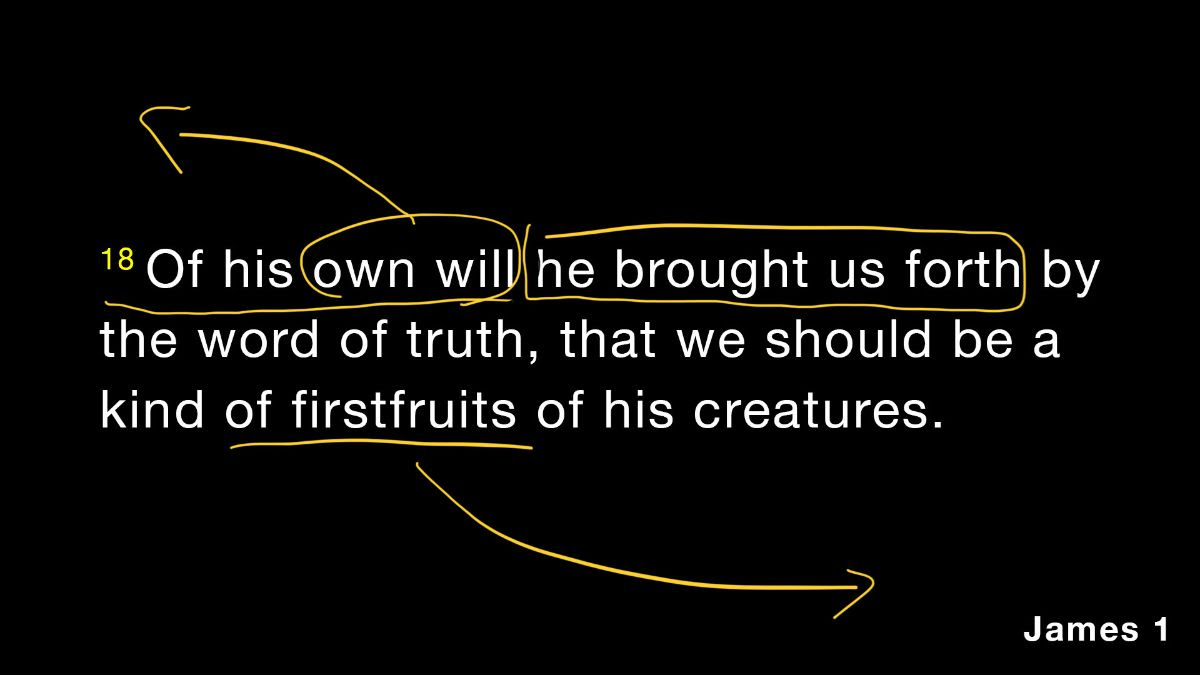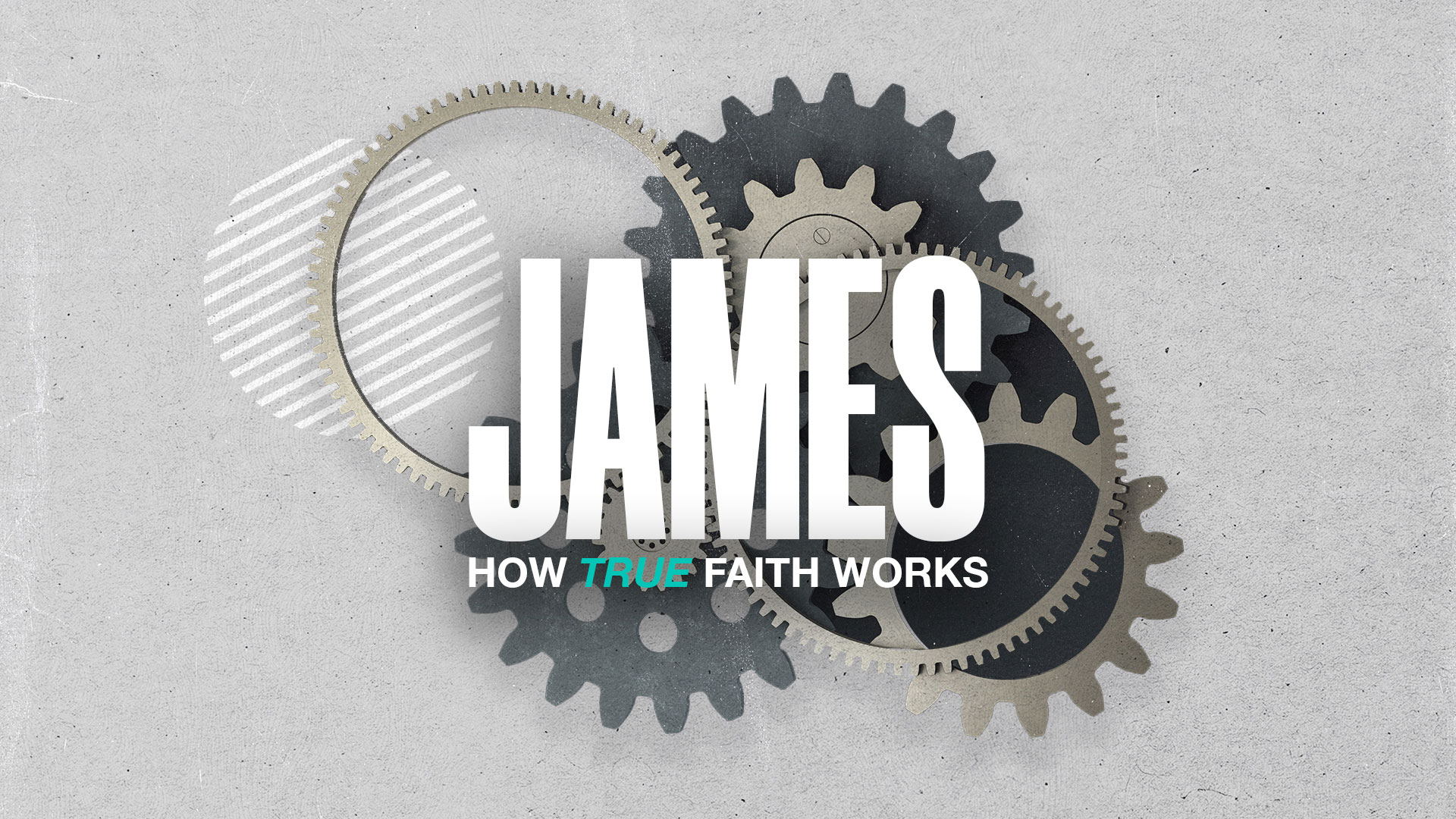A New Life, James 1:16-18
Discussion & Practice
James is teaching us about how faith really works and what you can expect with a life of faith.
God’s life is available to you, helping you be the person he’s calling you to be.
Every time you follow God, you experience life. When you do the opposite, you experience the opposite.
You don’t just need to be saved at the end. You need resources from God every day. That’s the life of faith you should expect.
We saw that trials often become temptations. Our desires turn into poor decisions and cause more pain. Sin is a very powerful force that perverts the good process God has for us. It causes misery. There will be times in your life where you’ll feel like you have no choice but to sin and you can easily blame God for that. Adam did it. He said the woman you gave me. She blamed the serpent. The serpent had no one to blame.
It would be easy to think, why did you bring her or him in my life? Why did you put me in this family?
James makes it clear, you will feel all those feelings often. But God is not responsible for your actions. He will test you to produce good in your life, but he will not tempt you. And he is not culpable for your sinful decision. James is saying this is very internal. It’s like he’s saying this is a personal problem. When someone says that, they’re usually saying, that’s not my problem, it’s yours. You’re on your own. But God doesn’t do that. He makes it his problem and creates a solution. Jesus says he’ll be the solution to the problem you have. That’s the gospel. It’s the story of the great pains that Jesus went to defeat sin and its wages, it’s death. That’s the only way that’s happening and it’s the good news of the gospel. Otherwise you’re left with this problem of sin.
Now, James is going to build on this. And his first line is this:

You really can’t feel the weight of this command about not being deceived until you get to the next two verses.
James is very community minded. We have a very real corporate identity. That reality comes to life as the text develops. Don’t be deceived.

There is a poetic doubling where James is trying to reinforce something. All that God is up to is good. All his movements and efforts are generous.
Moyer says, God underwrites, out of his endless bounty, every need for our defiled hearts.
This comes right after James lays out this process for developing towards death or towards life. James says that God has it. He has what our defiled hearts need.
What do our defiled hearts need?
When you’re going through whatever it is that is shaping you, because you’re always being shaped, you’re asking for wisdom. You don’t always know how that’s working out in your life.
God has a single-mindedness about giving you that wisdom. He has ample resources coming down from above to you.

The resources are outside of us, outside of created reality. He’s called a Father. The whole progenitor image is interesting because we’ve seen the reproductive process of sin. He’s a different kind of Father that produces different things. He’s called the Father of lights.
God is not like what he made. There’s no shadow of change at work in him. No shadows due to change in those lights.
I went on a bike ride in our neighborhood with my granddaughters riding along in a connected wagon. One of them noticed the shadow on the street and I explained why that happened. The reason it’s a vivid image is because it depicts reality as we see it. Sometimes we’re in the dark. Sometimes shadows are created and we get little bits of light. We can be very easily deceived and seduced into thinking this is all there is.
James is saying, be very careful, don’t be deceived, don’t confuse God with creation.
We have a shadow side and live in a world of shadows. James is bringing God out of the shadows in our minds. Above that, he is an intense light. Nothing blocks his light.
He literally, actually, perpetually, solely, and generously is giving for good through the chaos, making himself available and in a way that is very clear. No shadows.

This is one of the most creative ways I can think of that the New Testament describes the way God goes about defeating the process of death in us. It’s the gospel from eternity past all the way into the future in this text.
“Of his own will” is one word in Greek and it is emphatic. You have this horrible thing happening in our lives and you have God who is not impacted at all by it. He decided and desired in a way that is in contrast to the desires for sin at work in us. God has a desire and a will.
Say what you want about pain and death. Say what you want about the shadows that scare us. Blame them all you want. You can’t argue with God who looked at all of that and said, “I’ll enter it by my own choice and will. I have decided to step into that.” The mystery of evil is met by an even greater mystery, God’s own suffering and death by his own decision. Without Christ, that mystery doesn’t exist.
God stepped into our darkness at ultimate cost to himself. What went into that decision? He made us knowing he would have to go in and pay everything.
We could only produce death, nothing of what God intended. “He brought us forth.” It’s this same birthing image again. God’s desires create life. That’s why we use the phrase born again. That’s why Jesus explained to Nicodemus that it doesn’t matter what all you’ve accomplished, you have to start over.
This is God’s way of restoring radical goodness to the human soul.
Christianity is not a life enhancement project. Your problem and my problem is greater than that. It cost heaven everything.
The whole process of my life was formed against God. Everything. Which is hell and leads to it. Lost forever. And now, the possibility of being born again, spiritually regenerated, ready to act differently in all dimensions of our lives because of Christ. This is astounding.
We were having dinner last week with Gail’s aunt. Her son and his wife had a child with special needs who passed away two weeks ago. She was in town for that. It was really hard. He was in his late twenties. It took an incredible toll on the family. The rest of the family is looking in and asking how their marriage is going to survive now that they don’t have this person to take care of. Gail’s aunt said it would be impossible without Christ.
All the dimensions of our lives immediately open because of him. This is astounding when you think about it. Dallas Willard said God didn’t consider the sinning soul worthless. He could have just said there’s no hope and I don’t need it and they’re not worth it. That’s what makes this reality so overwhelming. All of our sin and corruption and perversion––still the human soul is worth saving to God.
That’s why the condition is so horrifying. To see human beings who are that valuable with only the ability to sin and create death is horrific. It’s horrific because of how valuable you are. If you didn’t matter it wouldn’t mean a thing. There would be no reason for God to act. This is what C. S. Lewis was saying in The Weight of Glory that you’re either an immortal horror or an everlasting splendor. There are no ordinary people. You’ve never talked to a mere mortal. You’re either talking to this glorious thing or something you’d meet in a nightmare.
That’s why God paid so much. And he’s not just giving us heaven. He’s making us heavenly, holy. How do you go from being hell-ish to being heavenly? You have to be reborn. James says how it happens.
When he says in verse 18 “word of truth,” how did God bring this about? The act of creation is seen as things that are spoken. God’s words are his power and action. He speaks it and it comes into reality. It’s what he wants, what is in him, and how he communicates and reveals himself. The gospel is God’s revelation of his determination to save and love.
Any time you see this word in the New Testament, it’s talking about the gospel, the death and resurrection of Christ. His death kills the death that we produce. His life opens up this reality we now have available to us. That’s the reality of the gospel. It pays the penalty for death and opens up an avenue or connection to God. Now he’s talking about these resources from above. He describes it like a new birth.
It’s called the word of truth, because when you hear it and receive it, you experience a connection with Christ that is very hard to explain, so that through his death you experience a death to your flesh and become alive to his life in you. His truth is not just understood. Truth here speaks of reality. It’s born into you.
He’s alive in you. You literally start over internally. You’d be very deceived if you didn’t realize something new was happening inside of you. What game could you be playing to be around religion and not have this new life in you?
Nicodemus asked if he had to go back in the womb, but no, it’s a spiritual thing. And he’s giving us gifts to mature us and perfect our character. When you’re born, when anyone is in Christ he is a new creature. The old has gone, the new has come. You have new needs and desires and need new sources of nourishment to survive. You need and want what God wants. All the sudden, you can imagine yourself doing the right thing. That’s one of my favorite ways to think of the spiritual life. Can you even imagine a godly thing to do in a given moment? Because he’s there, you can imagine it.
The other thing that happens in you is that a fight starts. The old way of sin and death, you fight against that.
That’s what genuine faith is doing to you. We are a firstfruits of his creatures. It’s Old Testament, Jewish language. Everything depended on the harvest. Your work and everything you did every day, survival depended on the harvest. The firstfruits, when the first crop showed up, you know if it doesn’t come through you have no sustenance. When it comes up and you see the fruit, it would be very tempting for the farmer to take all that into the barn just in case another harvest doesn’t come. God made them give that first harvest to him.
The firstfruits are the best ones. And God wants us to trust him for more.
In James, this is God saying that he gives every good gift. He gives it to you and brings you to life. Now, you are his firstfruits. Not only are you his firstfruits, but he is giving you as a gift to the world.
This is a corporate image. There’s no “first fruit.” It’s a whole crop. We are God’s gift. Our new lives are a gift to the world and a taste of things to come. You can bank on the redemption of all things. Let’s see it working to produce more.
Everyone can be confident that God is going to continue his creating work because of the creating work he’s already done in you. We’re already experiencing the life that awaits us. We are the first stage of all that God is going to do in the world. He’s a giver and is giving new life to each of us, and then gifting us to the world. When we act with compassion and justice towards the world, we show them what is coming. We’re symbols of the new creation. When you’re looking around at a dark world and wonder if God is doing anything or if he even cares, hopefully, he has done enough in you for you to remember that he’s at work.
I see him working inside. I’m not who I used to be. And he’s not done yet. We’re the firstfruits. There will come a new heaven and a new earth. James will say, hopefully you see that work in you, because it will give you hope for the future.
Have you been born again? You can trust Jesus Christ. For God so loved the world that he gave his only begotten Son that whoever believes in him will not perish but have eternal life.
Can you sense that reality inside of you?
Be reminded today that there is so much more in store if he’s began a good work in you.
Notes
- Read James 1:16-18. These verses warn us not to be deceived. Recall that the first time people are deceived in Scripture is in the garden where the lie was that God was holding out on them (Gen. 3:1-5). But what does this passage in James teach us about God's character and about his actions towards us?
- What are some good things people like to imagine came from their own accomplishments or from mere coincidence?
- How does recognizing the goodness of God’s character help us in our fight against temptation? How does it help us endure under trials?
- Have different people read Matthew 7:11, Psalm 34:10, and Psalm 84:11. What barriers do you have in believing what God says about his own heart towards you? What does it mean in verse 18 that we are the firstfruits of all his work? How does this influence how you view your value to God and your mission in the world?
Practice: Think back on your life and evaluate if there was ever a time when you doubted God’s goodness in his plans for you. Confess to him and reaffirm your faith that he wants what is best for you. Ask God how he wants you to use those good gifts for the life of the world.

